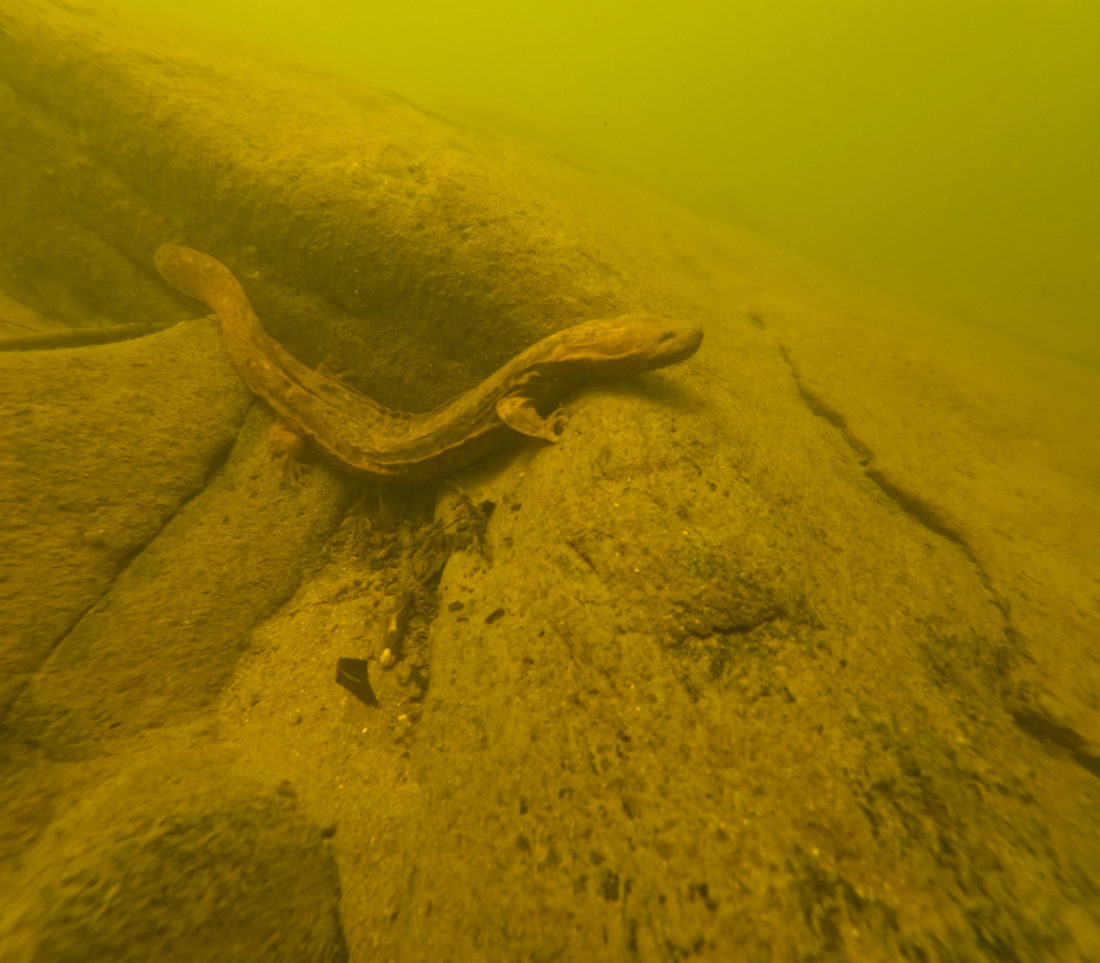By Katie Myers
This coverage is made possible through a partnership between BPR and Grist, a nonprofit environmental media organization.
After years of urging from conservationists, the U.S. Fish and Wildlife Service is proposing to add the eastern hellbender to the national endangered species list. This would protect the salamander throughout its range across 15 states from New York to Illinois to Mississippi.
Eastern hellbenders are a slimy, and very loveable brownish-orange salamander that thrive in the pristine, high mountain streams of Western North Carolina. However, their habitat has become increasingly threatened. The U.S. Fish & Wildlife Service’s announcement of proposed protections this week would aid conservation efforts to protect the region’s iconic amphibian.
Habitat fragmentation, deforestation, and development have threatened their habitat. Only 12% of the 371 documented eastern hellbender populations are considered stable.
Over half of these communities are in decline, with Western North Carolina hosting one of the most stable hellbender populations in the country. “The eastern hellbender has experienced a substantial reduction in the number of extant populations compared to historical numbers,” according to the U.S. Fish & Wildlife Service proposal.
Unique and widely beloved – with nicknames like the “mudpuppy” and “snot otter” – the hellbender even serves as a local soccer mascot. They’re also the largest salamander in North America.
In North Carolina, large, protected tracts of public land, and an abundance of high, clear mountain streams with oxygenated riffles allow the species to thrive in rocky creek bottoms, breathing in the water through their skin. Hellbenders are an indicator of stream cleanliness because they are so sensitive to pollution.
Part of what makes hellbenders so vulnerable is that “hellbenders are homebodies,” said ecologist and Watauga Riverkeeper Andy Hill. They pick a rock to live under and mostly stay there unless starving or looking for a mate. Once they reproduce, males defend their nests fiercely. Loss of home is traumatic for them.
Hill said endangered species protection couldn’t come at a better time because Helene severely damaged previous hellbender strongholds.
“Stormwater runoff carries the sediment of the stream, that kind of fills in that vital habitat, that rocky table where they live,” Hill said. Hellbenders love a clear, clean, cold stream with a rocky bottom. “So they cannot survive in a muddy, silty, sandy, little oxygen and environment, and unfortunately, one of the impacts of Hurricane Helene was massive flooding.”
Immediately after Helene, Hill said, many of the populations he monitored were absent from their usual streams and he encountered many lost hellbenders wandering by the side of the road or otherwise washed out of their homes.
There are multiple ways for a species to make it to the endangered species list, and one way is for conservation groups to make a compelling argument through a petition. In this case, the petition came from a regional consortium of conservation groups: Alabama Rivers Alliance, Clinch Coalition, Dogwood Alliance, Gulf Restoration Network, Tennessee Forests Council, and West Virginia Highlands Conservancy. After a petition, the U.S. Fish & Wildlife Service evaluates the potential need for federal protections and can move to add a species to the endangered list, according to Gary Peeples, deputy field office supervisor for the wildlife service in Asheville. “What we do is we enter into our process where our biologists compile, basically, all the information we can find on the species,” Peeples said.
Before the hellbender can be listed officially as an endangered species, the U.S. Fish and Wildlife Service must open a 60-day public comment period, which began Dec. 13.
Public comment on federal agency actions often elicits general support or opposition from those who submit. But Peeples urged those interested to share comments that “expand our knowledge about the species.”
“For example, we’ve been getting reports from folks about Hurricane Helene impacts and what they’ve seen.”
If listed as an endangered species, it would become illegal to harm hellbenders, remove them from the wild, or kill them.




Before you comment
The comments section is here to provide a platform for civil dialogue on the issues we face together as a local community. Xpress is committed to offering this platform for all voices, but when the tone of the discussion gets nasty or strays off topic, we believe many people choose not to participate. Xpress editors are determined to moderate comments to ensure a constructive interchange is maintained. All comments judged not to be in keeping with the spirit of civil discourse will be removed and repeat violators will be banned. See here for our terms of service. Thank you for being part of this effort to promote respectful discussion.